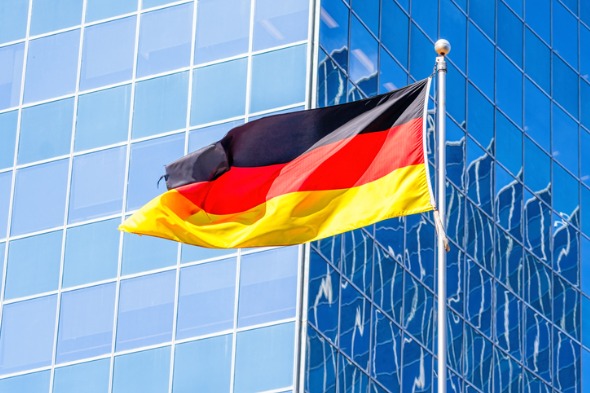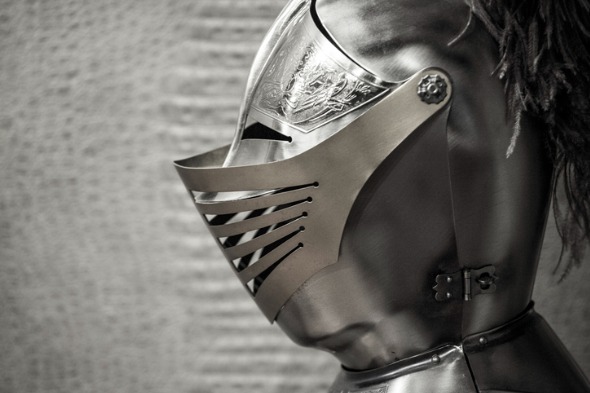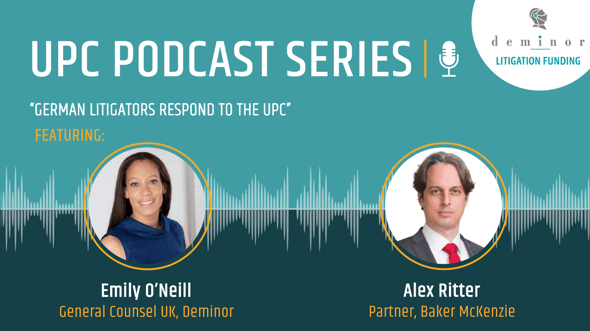In this podcast series, Emily O'Neill General Counsel UK and Global Intellectual Property lead for Deminor Litigation Funding, undertakes interviews with global professionals to understand the implications of the new Unified Patent Court (UPC).
Deminor welcomes you to join this conversation as we summarise the key elements of the conversations between Emily O'Neill and these experts, as captured in the podcast transcripts below.
What is the UPC?
The Unified Patent Court (UPC) is a new European court system designed to harmonise and simplify the patent dispute landscape in Europe.
The UPC was established in order to provide a unified patent enforcement system with jurisdiction over ratifying EU member states. Countries that are Member States of the European Patent Convention (EPC) but are not EU member states cannot join the Unitary Patent or Unified Patent Court. As a unified court with a multi-state jurisdiction, the UPC hopes to be faster, more efficient and more cost-effective in resolving patent disputes.
The UPC's structure is made up of a Court of First Instance that is divided into central, local and regional divisions. Its central divisions are located in Paris and Munich. The third seat of the central division was originally assigned to London. The Italian Foreign Office published a press release that an agreement has been reached with France and Germany to set up a branch of the Central Division in Milan. This agreement now needs to be approved by the other UPC contracting states during the next meeting of the Administrative Committee in June 2023. The press release states that the Milan court is in the process of being set up and will be operational within the next year. In the interim, the Presidium of the UPC decided, that initially, the Paris and Munich central division seats will share this caseload. Cases concerning human necessities are assigned to Paris and those involving chemistry and metallurgy to Munich for now.
The UPC’s Sunrise period launched on March 1st and allowed patentees to opt out of the exclusive jurisdiction of the new system to take effect from the court coming online on 1 June. Approximately 460,000 European patents and patent applications have been opted-out during Sunrise. Opt-outs are still possible now and at least during the 7-year transition period, unless proceedings are pending in the UPC, and will take effect once filed.
However, this is a new and untested forum, located in civil law jurisdictions but with elements of common law such as disclosure, cross-examination and adverse party costs. Notable jurisdictions such as the UK and Spain are not within the UPC - How will companies mitigate their commercial litigation risks in this environment?
Podcast Preface:
Deminor General Counsel UK, Emily O'Neill (EON), speaks with Alex Ritter, Partner and Head of Patent Litigation Germany at Baker McKenzie. Alex holds over 10 years of litigation experience and heads Baker McKenzie's German Patent Litigation Practice.
In this interview with Emily O’Neill, Alex provides his thoughts as to how the Unified Patent Court (UPC) will be approached and used by litigators in Germany and provides valuable insights into the German Judges presiding over UPC cases.
Podcast Transcript:
EON - The new court will have a lot of known judges using new procedural rules. What's your experience with those judges? And how do you think that will lead to predictability in decisions?
AR - They'll be heavily influenced by national traditions. This is what we’ve seen in various mock trials.
The way the rules are applied will be decisive. The material provisions on patent validity as such are the same in front of the EPO, national courts or the UPC. Nevertheless, the application of these rules by the judges can lead to very different results. For example, there are different views on claim construction, so you have to take that into consideration. With the EPO, it’s possible to have a patent revoked, because a comma has disappeared in a claim; this would be unthinkable in a German court. On the other hand, there are decisions like the "rotor elements" decision from the German Federal Court of Justice, where the patent was maintained based on a claim construction that was against the explicit claim wording; that would have been unthinkable in front of the EPO.
"I expect the first-instance decisions from German local divisions to be fairly predictable. The same might be true for other Local Divisions with two legally qualified judges from the respective jurisdiction" - AR
I think this demonstrates that it's really about the way provisions are applied. And the situation is similar when it comes to infringement. For example, if you have Article 25 UPCA on direct infringement, it generically states that you should not infringe a patent. This is essentially the same provision we have in Germany and in other member states. However, the effect this provision will have will depend on whether judges will apply broad functional claim constructions like we do in Germany, or whether they will focus on the claim language like the EPO.
I expect the first-instance decisions from German local divisions to be fairly predictable. The same might be true for other Local Divisions with two legally qualified judges from the respective jurisdiction. In Munich, we recently had a conference where the judges from the Munich Local Division stated they will try to stick to the Munich procedure as much as possible. They want to reduce uncertainty.
However, they also mentioned a few things they expect to change. For example, they intend to regularly decide on validity too. So the German bifurcation would belong to the past. Some time ago, that question raised concerns, especially in the UK. There was a fear that Germany would continue with a bifurcated system, but this isn’t likely to be the case.
"We can also expect the Munich Local Division to grant preliminary injunctions based on patents that have not been tested in contentious validity proceedings." - AR
Another aspect will be the handling of preliminary injunctions. In the past, judges in Munich would have been keen to grant more preliminary injunctions, but were hindered by their appeal court - the Higher Regional Court Munich, which handles the urgency requirement to grant preliminary injunctions very strictly. You have one month for filing an application for a preliminary injunction, starting from the day that you became aware of the infringement. However, with the UPC, things will be different. The Munich Local Division will probably be fine with a period of two to three months.
We can also expect the Munich Local Division to grant preliminary injunctions based on patents that have not been tested in contentious validity proceedings. It was the District Court Munich who actually submitted a case to the European Court of Justice because they disagreed with their appeal court that stated untested patents generally weren't a proper basis for rendering a preliminary injunction. Now at the UPC, those judges don't have that Higher Regional Court above them anymore and so they can apply their own standards.
EON - How will German litigators compete in the UPC with lawyers from other jurisdictions who can work on contingency?
AR - I don’t think this will be the relevant issue. When I speak with clients, they want lawyers to understand their needs, their business, and technology. In many cases, there are long-established relationships between clients and trusted advisors.
However, if the UPC leads to a partial reshuffling of the cards I think that will come from another direction. What I hear from clients is that they are increasingly keen to see diverse teams, which will be due to the international way the UPC is set up.
"And if you expect judges to be influenced by their legal traditions, it is considered highly beneficial for the client to be represented by a team that understands those different traditions." - AR
In Germany, France, or the Netherlands, for example, the third legally qualified judge needs to be from a different member state and in local divisions that are not expected to be used as frequently two legally qualified judges will be from a different member state. This will also hold true in the appeal court where all three legally qualified judges will be from different member states. And if you expect judges to be influenced by their legal traditions, it is considered highly beneficial for the client to be represented by a team that understands those different traditions.
I saw an example as to how this might play out in practice in a mock trial handling questions of indirect infringement and where the proposed solution was to apply the French standard, arguing that if the patent is infringed under this strict standard, then it should be considered infringed across the UPC region. I think that is a very interesting approach.
There are further legal aspects of the UPC that will be handled according to national law, such as arguing prior use rights. And then you have enforcement, which will be governed by national rules and national courts.
EON - How is your firm structuring your UPC litigators? Are you going to have a specific team dedicated to UPC?
AR - Yes, we have done for quite some time now. We set up internal teams to advise clients on opting out, and how they can prepare for the new system. We’ve been preparing for this for months and years now, so we’re looking forward to litigating in this new court.

EON - How do you think costs will compare between a German National Action and UPC action?
AR - I think it will be more expensive. How much more expensive it remains to be seen. The broader territorial scope means that there will be more infringing acts to plead and prove in the case which should also increase the value of the dispute. I see this system requiring a lot of additional time and effort too. There will be a lot of tight deadlines. And the interplay of UPC law and national law might well increase the work required, so infringement proceedings will be more expensive.
On the other hand, you can replace a plurality of national proceedings with one UPC case. By our calculations, we expect the UPC will be cheaper once it replaces three national infringement proceedings.
The system could also be attractive for independent invalidity actions given the very low court fees for those actions. This is especially true since you can bring such an action in parallel to an EPO position. I wouldn’t be surprised if this is used frequently from the beginning.
EON - We have seen 460,000 patents were opted out during the sunrise period and we can see some of the statistics around types of companies that have chosen to opt-out. What are your experiences with clients so far?
AR - The statistics are becoming more relevant than they initially were at the outset of the sunrise period, although patents can continue to be opted out (provided no UPC action has been started) during the 7-year transition period. At the beginning of the sunrise period, there were a lot of problems with technical access to the court’s case management system. It wasn’t easy for patent attorneys to get the key cards to participate in the system and actually conduct the opt-out.
Now that we’re seeing more accurate and regular stats, it seems a lot of pharma companies are choosing to opt-out. And this was expected from the get-go. There are a lot of high-value, individual patents in pharmaceutical portfolios, which increases the risk coming with a centralized action for revocation. Also, tech companies are opting-out. This won’t necessarily mean that they won't want to make use of the new system. They might want to protect the patents from central revocation now and assess on a case-by-case basis at a later stage.
"Now that we’re seeing more accurate and regular stats, it seems a lot of pharma companies are choosing to opt-out. And this was expected from the get-go." - AR
Many of our clients are also taking a selective approach. They’re analysing their patent portfolio, deciding on a specific patent, and whether they should keep it in the system or remove it.
But that really depends on the industry in question. For example, if you’re a German automotive supplier and your main competitors are other German automotive suppliers, then you might have an interest in Germany, the United States, and China. In such a case, the UPC might not be the right choice for you. Thus, depending on the industry, we’ll also see changes in prosecution strategy over the next few months like some companies going back to national filings.

EON - Are you excited about the UPC?
AR - Yes, definitely. This is the biggest change in European Patent Litigation since the 1970s when the European patent convention was originally put into place. And it’s also the first pan-European Civil Court. Being a part of this from the beginning is definitely exciting.
EON – There are four local divisions in Germany. How do you think cases will be spread between them? Do you think one will be busier than the others?
AR - The Munich unit will definitely be a front runner. There, we have two well-known judges with a long-standing case law history. So I think we will have the most reliable predictions here. This makes the local division in Munich very attractive.
However, the same might hold true for other divisions too. Historically, many tech cases have gone to Mannheim because of the experience of the courts and judges there. This will definitely give Mannheim a boost too.
EON – You mentioned that one of the purposes of creating the UPC was to benefit mid-sized companies. Do you think that mid-sized companies will actually use the system?
AR - I think it does not depend on the size of the company but whether the UPC will provide benefits over the current system.
This depends on the industry too. For example, the UPC might be really interesting for the medical device industry where there is often a high patent density and so that the risk of losing a patent in centralized validity proceedings would not have such a big impact. Also, the profit margin is high. It would be attractive to cover the patchwork of big and small markets with one infringement action, so UPC makes sense here.
And then very individual factors can be decisive. I recently spoke to a client who wanted to file suit in Italy but was discouraged by the duration of national proceedings. They were actually very keen to make use of the UPC to cover this territory, so I think it really comes down to a case-by-case decision whether to make use of the system.
EON – What are the limitation periods for damages? And can the court award damages for wrongs that happened before the court came online?
AR - This is a tricky one since the transitional regime wasn't fully thought through to the end. So, one could make the argument that the UPC cannot award damages for acts of infringement that occurred before the UPCA came into force. On the other hand, the patent was in force, it was infringed in the member states and Article 68 UPCA, which is the provision governing damages, only refers to that infringing activity. So, I personally don’t think the system wants a reset button to be pressed. This wasn’t the intention. Instead, there is a clear aim that damages should be awarded for infringement that actually occurred.
The courts will of course provide us with an answer once the system has started. This is also true with regard to the statute of limitations. According to Article 72, this is five years. However, the interplay with the national rules on limitation will need to be clarified.

UPC Podcast Series - Next steps and further information:
Thanks for joining Deminor's UPC Podcast Series as we deep dive into the ins and outs of the new Unified Patent Court.
Keep a look out for our upcoming conversations as Deminor General Counsel UK and Global Intellectual Property lead, Emily O'Neil, speaks with several more experts to get their insights on the UPC.
If you would like to connect with either Emily or Alex on LinkedIn, please click on the links below:
Emily O'Neill - Deminor General Counsel UK and Global IP lead
Alex Ritter - Baker McKenzie Partner and Head of Patent Litigation Germany
***
Further Reading:
- https://www.deminor.com/en/case-studies/co-funder-proposes-sharing-of-litigation-funding-risk-to-leverage-deminors-in-house-due-diligence-capability
- https://www.deminor.com/en/case-studies/financing-assertion-of-patents-protecting-manufacturing-processes
- https://www.deminor.com/en/case-studies/telecoms-patent-assertion-multi-jurisdictional-campaigns
- https://www.deminor.com/en/case-studies/canadian-innovative-start-up-preparing-for-a-david-v-goliath-litigation-funding-battle
- https://www.deminor.com/en/case-studies/whats-the-risk-assessing-the-risk-of-counter-assertion-by-the-defendant-in-patent-litigation
- https://www.deminor.com/en/case-studies/overstepping-the-mark-litigation-funding-trade-mark-infringement
- https://www.deminor.com/en/case-studies/lights-camera-action-recovering-damages-for-infringement-of-rights-in-a-short-film
- https://www.deminor.com/en/case-studies/recovering-damages-for-stolen-software-through-litigation-funding
- https://www.deminor.com/en/case-studies/funding-in-the-pharma-sector-/-investing-in-a-case-where-litigation-is-already-ongoing






